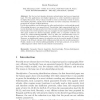82 search results - page 12 / 17 » Deciding knowledge properties of security protocols |
EUROPKI
2009
Springer
13 years 7 months ago
2009
Springer
Abstract. An electronic signature is considered to be valid, if the signature is mathematically correct and if the signer's public key is classified as authentic. While the fi...
CCS
2005
ACM
14 years 3 months ago
2005
ACM
This paper provides a formal framework for the analysis of information hiding properties of anonymous communication protocols in terms of epistemic logic. The key ingredient is ou...
CISC
2005
Springer
14 years 3 months ago
2005
Springer
The formal analysis of cryptographic protocols has developed into a comprehensive body of knowledge, building on a wide variety of formalisms and treating a diverse range of securi...
PKC
2000
Springer
14 years 1 months ago
2000
Springer
For the two last decades, electronic authentication has been an important topic. The first applications were digital signatures to mimic handwritten signatures for digital document...
MMSEC
2006
ACM
14 years 3 months ago
2006
ACM
Current zero-knowledge watermark detectors are based on a linear correlation between the asset features and a given secret sequence. This detection function is susceptible of bein...

